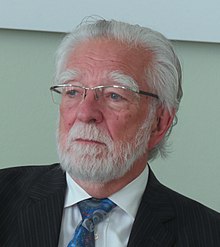Anthony Cerami
Anthony Cerami (* 1940 in Newark , New Jersey ) is an American biochemist . He made a contribution to research into tumor necrosis factor (TNF).
Life
Cerami earned a bachelor's degree in biochemistry and chemistry from Rutgers University in 1962 and a Ph.D. from Rockefeller University in 1967. in biochemistry. He worked as a postdoctoral fellow at the Jackson Laboratory . In 1969 he received a professorship at Rockefeller University. In 1991 he became President of the Picower Institute for Medical Research at the State University of New York , and from 1997 he was Chairman of the Board of Directors of the Kenneth S. Warren Institute . Since 2006 he has been a member of the board of directors of the Feinstein Institute for Medical Research and chairman of the board of directors of the company he founded, Araim Pharmaceuticals .
Research work
During a stay in Africa in 1978, Anthony Cerami was amazed that numerous European cows suffered from cachexia and died, although he could only detect so few trypanosomes in their blood that they could not be the sole cause of the cattle disease. In the course of the following ten years, he and his group succeeded in detecting and displaying a protein in pure form, which was known as cachectin and which in experiments could reliably induce cachexia in healthy mice. When it became technically possible to analyze the sequence of proteins, it turned out that cachectin was identical to the protein known as tumor necrosis factor.
In the years that followed, Cerami was able to make significant contributions to the pathophysiology of tumor necrosis factor and show that it is a messenger substance of the immune system that plays a role in the development of autoimmune diseases , among other things . He was involved in the development of monoclonal antibodies against TNF, from which the drugs Remicaid and Humira were developed, which are used against rheumatoid arthritis , psoriasis or Crohn's disease . He identified erythropoietin as the antagonist of TNF and is involved in the development of erythropoietin analogues , which are to be used as drugs in inflammation. Cerami's other work deals with diabetes mellitus and aging, as well as with the cachexia in certain infectious diseases . Cerami owns more than 150 patents and author of more than 500 scientific publications . It has (as of January 2018) an h-index of 156.
In 1991 Cerami became a member of the National Academy of Sciences and in 2001 the American Academy of Arts and Sciences . In 1999 he received the Banting Medal of the American Diabetes Association , for 2018 he was awarded the Paul Ehrlich and Ludwig Darmstaedter Prize together with David Wallach . Cerami received honorary doctorates from the Johann Wolfgang Goethe University in Frankfurt am Main and the State University of New York in 2006 and from Jichi Medical University (Japan) in 2011 .
Publications
- A Forty-Year Odyssey in the Sea of Translational Medicine , in: Proceedings of the American Philosophical Society, Vol. 158, No. 4 (December 2014), pp. 400-410.
Web links
- Anthony Cerami, PhD and CV at anthonycerami.org
- Live data, publications and Academic pedigree of Anthony Cerami at academictree.org, accessed on 23 January 2018th
- Background information from the University of Frankfurt. On: uni-frankfurt.de from March 14, 2018
Individual evidence
- ↑ Sidney Weinhouse: Cover Legend. (PDF) In: Cancer Research. American Association for Cancer Research , May 15, 1995, accessed January 23, 2018 .
- ↑ Anthony Cerami - Google Scholar Citations. In: scholar.google.de. Retrieved January 23, 2018 .
- ↑ Anthony Cerami. In: nasonline.org. Retrieved January 23, 2018 .
- ↑ Book of Members 1780 – present, Chapter C. (PDF; 1.3 MB) In: American Academy of Arts and Sciences (amacad.org). Retrieved January 23, 2018 .
- ↑ Banting Medal for Scientific Achievement Award: American Diabetes Association (English) ( Memento of November 13, 2016 in the Internet Archive )
- ↑ Anthony Cerami and David Wallach receive the Paul Ehrlich and Ludwig Darmstaedter Prize 2018. (PDF, 75 kB) Press release of the Johann Wolfgang Goethe University Frankfurt am Main of January 23, 2018.
| personal data | |
|---|---|
| SURNAME | Cerami, Anthony |
| BRIEF DESCRIPTION | American biochemist |
| DATE OF BIRTH | 1940 |
| PLACE OF BIRTH | Newark , New Jersey |
